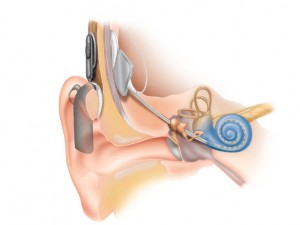Cochlear implants are highly advanced medical devices that work differently from conventional hearing aids which amplify sounds. A cochlear implant bypasses the damaged portion of the inner ear and provides sound signals to the brain by stimulating the auditory nerve. This provides an opportunity for the severely hard of hearing to perceive sound sensations.
How do Cochlear Implants work?
A cochlear implant comprises two main components — a surgically implanted internal part that directly stimulates the auditory nerve, and an external sound processor worn on the ear to receive sound signals. The two components are coupled using a strong magnet and work together to convert sounds into electrical signals that are sent to the brain where they are interpreted. This process happens so rapidly that the user will hear speech and other sounds without any noticeable delay.
Who should get a Cochlear Implant?
Patients with severe-to-profound hearing loss who do not benefit enough from hearing aids should consider a cochlear implant. It is suitable for adults and children as young as six months old. Experts recommend implantation as early as possible to expose children to sounds for optimal listening and spoken language development. For adults, cochlear implants can help restore hearing and improve their communication and quality of life.
Hearing Loss
Hearing loss can be a result of many causes, but the severity of impairment varies depending on which part of the ear is damaged and the seriousness of it. Amongst the inner, middle and outer parts of our ear, damage to the inner part ie; the cochlea, will cause more severe cases of hearing loss. There can be several reasons for a damaged cochlea.
It may be from exposure to loud noise which is a common cause, a birth defect, injury to the ear, trauma, genetics or aging. Therefore, cochlear implants are not only for old people but of all ages. The biological difference between a damaged and healthy cochlea is how well the hair cells that are used in the ear to transmit sound waves to the hearing nerve is functioning. Damaged hair cells are what make the loss of hearing.
The way a damaged cochlea is treated is using cochlear implants. To treat a damaged ear it is crucial to get it diagnosed by an ENT specialist at the earliest stages possible. The difference between cochlear implants and hearing aids is that cochlear implants are surgically implanted versus hearing aids which are impermanent. The difference from treating hearing loss with hearing aids or implants depends on the type of treatment needed. Hearing aids, amplifies sounds whereas implants treat the damaged hair cell to stimulate the hearing nerve and pass on information to the brain. When it comes to deciding which treatment/aid will best resolve the problem, it will depend on the severity of each case, which part of the ear is damaged and what is the preference of treatment.
Due to the complexity of the treatment of cochlear implants that requires surgery, the treatment is not for everyone. ENT specialists will only offer patients the option of a cochlear implant if the damage is severe and hearing aids are not sufficient. Whether a child (above 2 years old) to middle age and older, it is up to discretion by specialists to determine whether cochlear implants are required. Due to them being controversial, very expensive and having uncertain results, the procedure is limited to people with only severe cases of hearing loss or deafness.
 Tasselline | Latest Articles By Singaporeans, for Singaporeans Article Site for Singaporeans
Tasselline | Latest Articles By Singaporeans, for Singaporeans Article Site for Singaporeans


